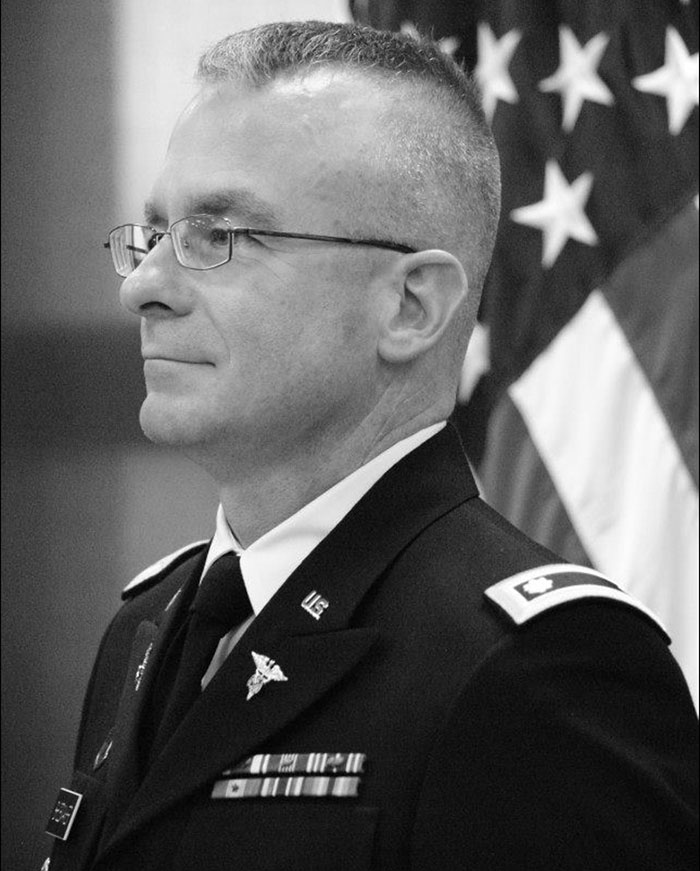Once Again, for the First Time: Shoemaker Joins USAMRDC Team to Tackle Pandemic

LTC David Shoemaker was nearly a decade removed from Army life when he got the itch again. Sitting at home in Maine, enjoying retirement with his wife, he – like so many others across the country – spent the early part of 2020 watching the global spread of the novel coronavirus pandemic from his living room sofa. That's when he decided to spring into action.
"I told my wife that I'd like to be able to help out somehow," says Shoemaker. "I said, 'If the Army was willing to take me back, I think I could make a difference.'"
So with twenty years of active service already under his belt, Shoemaker decided to do just that – to come back for more. In March, he called the U.S. Army Medical Research and Development Command's (USAMRDC) Principal Assistant for Acquisition, Ms. Dawn Rosarius, and asked, in so many words, if the Command needed someone with his skillset. Turns out they did, and by May 29 he was back in the saddle once again – this time as a so-called "Retiree Recall" – supporting the Command's Additive Manufacturing Working Group and U.S. Department of Defense (DOD) diagnostic efforts by providing both technical and regulatory expertise.
Specifically, Shoemaker spends his days focusing on the nearly 200 different COVID-19 testing assays the U.S. Food and Drug Administration (FDA) has currently cleared for use via Emergency Use Authorization (EUA).
"There are some regulatory nuances that are very important for the leadership of the Army to understand when you are using and deploying these tests," says Shoemaker. "And that's where I really thought I could be of use, was assisting the DOD with the regulatory aspects of their tests."
Shoemaker's previous service career, which spanned from 1993-2013, makes that tall order easier to fill than you might imagine. Indeed, while he spent a large chunk of that time overseeing the development of diagnostic tests for bio-threat agents (even serving at USAMRDC's United States Army Medical Research Institute of Infectious Diseases (USAMRIID) from 1998-2002), Shoemaker's specialty was the diagnostic area of regulatory aspects; in fact, the Army once sent him to the FDA for a one-year training assignment to further ingratiate himself into the system.
Those kinds of bona fides make Shoemaker a key part of USAMRDC's effort moving forward.
"LTC Shoemaker was a great add to our team at a very critical time," says Rosarius. "His knowledge, expertise, and ability to provide clear guidance to help safely and efficaciously support our Warfighters and the Nation have proven to be of critical value."
"I do feel successful in what I've been doing," says Shoemaker, noting that he's been able to use the DOD connections he's garnered over the years to help facilitate a new generation of partnerships. "I've been able to reach out to [those same people] for assistance and for help, and I've been able to connect people I'm working with at USAMRDC to other people from my previous network."
He's doing all that work from home, of course, just like so many other people these days. But for Shoemaker, home is now an apartment in Frederick, Maryland; he moved down from Maine when he started at USAMRDC, leaving his wife – a retired civilian microbiologist who formerly worked at the National Institutes of Health (NIH) – at home for the time being, some 550 miles away.
"It's kind of like being deployed," says Shoemaker, who points out that his wife is fully supportive of his effort ("She's a trooper," he says). "We went into this thinking that we would be a part for at least a year, that we wouldn't see each other for at least a year."
The clock has been ticking on that new, extra year of military service – 21 years overall, if you're counting at home – for the past few months. Shoemaker is technically designated as an "activated reservist," and his orders at USAMRDC are capped at 179 days (though leadership has been clear, he says, that he can stay longer if he likes).
In the end, Shoemaker's story is like so many others within the military, within the DOD at-large: someone volunteers, or someone makes a personal sacrifice because they feel they can impact the larger effort in some capacity. As for how long this second tour with the Army will truly last, Shoemaker admits the ultimate arbiter will be the combined effort to combat the novel coronavirus itself.
Says Shoemaker, "I hope that point is when we have effective vaccines and treatments for COVID-19 and we can get back to some semblance of normal living again."
 An official website of the United States government
An official website of the United States government
 ) or https:// means you've safely connected to the .mil website. Share sensitive information only on official, secure websites.
) or https:// means you've safely connected to the .mil website. Share sensitive information only on official, secure websites.


